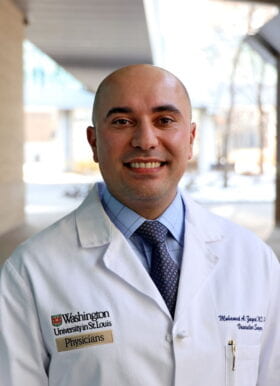Mohamed Zayed, MD, PhD, MBA, a professor of surgery, radiology, molecular cell biology, and biomedical engineering at Washington University School of Medicine in St. Louis, received a Washington University Gap Fund award to perform translational work to de-risk and mature technology related to the Aorto-Iliac Fenestrated (AIFEN) Stent System, a fenestrated balloon expandable stent system for the treatment of aortoiliac occlusive disease that emerged from the CardioVascular Research Innovation in Surgery & Engineering (CVISE) Center.

Aorto-iliac occlusive disease is caused by atherosclerotic plaque accumulation in the abdominal aorta where it connects to the common iliac arteries. The plaque accumulation can significantly reduce blood flow to the lower extremities and pelvic organs, resulting in high morbidity, disability, and the increased risk of amputations. Currently there are two methods to treat this disease, open bypass surgery or stenting the aorto-iliac arterial segment. Stenting, a non-invasive procedure, is routinely used but the inverted Y shape of the arterial segment currently does not have a compatible stent to treat this segment. It is common ‘off-label’ practice to place two adjacent stents in a “kissing” configuration in order to provide flow from the aorta into each of the common iliac arteries. However, this approach has limited long-term patency and durability.
With this award, Zayed and his team will evaluate how the patented AIFEN stent performs on patency over time compared to the use of “kissing” stents.
This Gap Fund Award will be instrumental in conducting feasibility and early efficacy studies in the aorta of large animals that are similar in size to human anatomy. We hypothesize that these studies will help validate our stent design and help inform how we can further optimize the stent design for translation into humans.
Mohamed A. Zayed, MD, PhD, MBA
The WashU Gap Fund provides financial support for translational work that will increase the quality and value of promising medical, engineering, and physical sciences technologies created by WashU researchers. It aims to increase the chances of these technologies to attract the necessary industry partners to commercialize them into products and services that benefit society.
Interested in learning more about the WashU Gap Fund? More information is available on the OTM website or contact Malcolm Townes, PhD, MBA, innovation fund manager at townes@wustl.edu.
